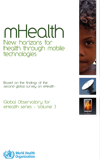
Only five years ago who would have imagined that today a woman in sub-Saharan Africa could use a mobile phone to access health information essential to bringing her pregnancy safely to term? Mobile phones are now the most widely used communication technology in the world. They continue to spread at an exponential rate - particularly in developing countries. This expansion provides unprecedented opportunities to apply mobile technology for health. How are mobile devices being used for health around the world? What diverse scenarios can mHealth be applied in and how effective are these approaches? What are the most important obstacles that countries face in implementing mHealth solutions? This publication includes a series of detailed case studies highlighting best practices in mHealth in different settings. The publication will be of particular interest to policymakers in health and information technology, as well as those in the mobile telecommunications and software development industries.
Download mHealth: New Horizons for Health through Mobile Technologies (.pdf, 3.323 KB).
Download from eHealthNews.eu Portal's mirror: mHealth: New Horizons for Health through Mobile Technologies (.pdf, 3.323 KB).
About Global Observatory for eHealth
The Observatory's mission is to improve health by providing Member States with strategic information and guidance on effective practices and standards in eHealth.
Its objectives are to:
- provide relevant, timely, and high-quality evidence and information to support national governments and international bodies in improving policy, practice, and management of eHealth;
- increase awareness and commitment of governments and the private sector to invest in, promote, and advance eHealth;
- generate knowledge that will significantly contribute to the improvement of health through the use of ICT; and
- disseminate research findings through publications on key eHealth research topics as a reference for governments and policy-makers.